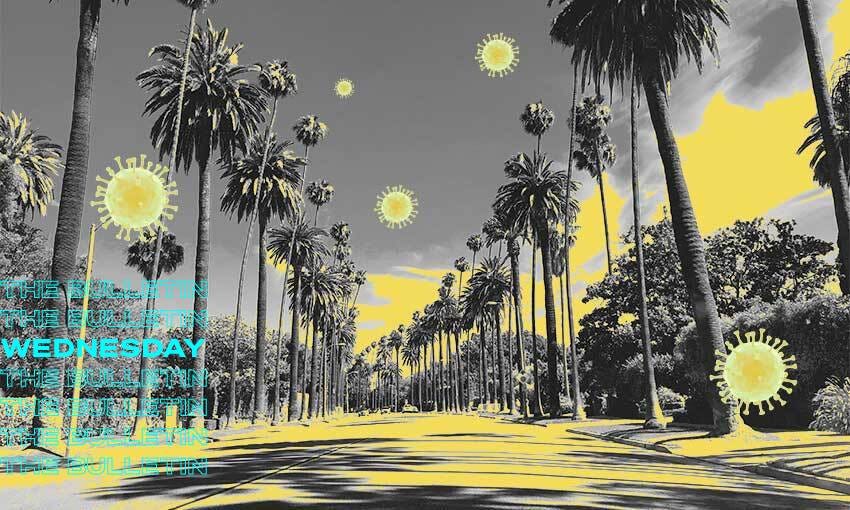What is Covid XE?
The new variant is highly transmissible, but experts caution little is yet known about XE
Mōrena and welcome to The Bulletin for Wednesday, April 6, by Justin Giovannetti. Presented in partnership with Z Energy.
In today’s edition: UN Security Council to consider war crimes; how housing got this bad; the climate clock is ticking; but first, what we know about the new Covid variant.
XE is raising alarms. What’s to know about the newest variant. (Getty Images/Tina Tiller)
XE is potentially 10% more transmissible than omicron.
Global health authorities are keeping a close eye on the new variant and the World Health Organisation has warned it could be up to 10% more transmissible than Omicron’s BA.2 subvariant. For context, BA.2 was potentially the most infectious Covid variant seen before XE and is fuelling new waves of cases around the world. BA.2 is currently the dominant strain in New Zealand. As Stuff explains, in this third year of the pandemic numerous variants, subvariants and recombinations have been detected, but most never spread far. Much isn’t yet known about XE, but early indications have led the WHO to urge caution.
What’s the deal with XE?
The variant was first detected in the UK in mid-January and over 600 cases have now been identified across that country. Unlike omicron and delta before it, XE is a recombinant. That means someone got infected with the two omicron subvariants, BA.1 and BA.2, simultaneously. As the virus replicated in their body, it made mistakes, copying bits of both subvariants and making a new hybrid. Voila, XE. The spike protein in XE was taken from BA.2. That’s the first part of the virus our immune system sees, so someone who was previously infected with BA.2 should have some level of protection. The NZ Herald reports that a 10% boost in transmission advantage is slight, so it’s not an unprecedented threat.
Should you be worried about XE?
Probably not right now. Millions are currently infected with Covid around the world and while the pandemic doesn’t cause as much fear and dread as it once did, we should remain alert. With so many cases, Covid is constantly changing. XE will make its way to New Zealand eventually, especially as border settings are relaxed. The variant is so new, it doesn’t have an official name yet. Jemma Geoghegan, a virologist at the University of Otago, explains:
“XE has not been assigned its own Greek letter yet. For the moment, it belongs to Omicron until significant differences in transmission and disease characteristics, including severity, are identified. So far there is not enough evidence to draw conclusions about the transmissibility, severity or immune evasion properties of XE. It is quite likely this recombinant would possess similar disease characteristics to its ‘parents’, BA.1 and BA.2.”
New Zealand has plans for wider surveillance to pick up new variants.
The country is on watch for XE and other new variants that will arrive. Director-general of health Ashley Bloomfield explained to RNZ that wide national testing is needed as we enter winter. With concerns about the return of flu, after a two year absence, keeping tabs on new variants will inform the country’s health response to Covid and other illnesses. The NZ Herald reports that Bloomfield warned a highly transmissible variant, worse than omicron, could force the return to stricter Covid rules. It won’t be clear for days or weeks whether XE could be that variant.
We need your help! The Spinoff's independent, homegrown journalism is only possible because of our members.As we struggle against the continued erosion of the media business by big tech platforms and now the commercial uncertainty brought on by the pandemic, reader support is critical.
If you can, support independent media today by becoming a member.
Russia and Ukraine to argue war crimes at Security Council.
Russia has denied it has committed atrocities in Ukraine and says it will present proof today to the UN Security Council. Ukraine’s president, Volodymyr Zelenskiy, also addressed the body. Reuters reports that the US and Europe are preparing fresh sanctions against Russia. There are growing demands Russian president Vladimir Putin personally face a war crimes trial. In New Zealand, the opposition is demanding to know why the government won’t send the country’s anti-tank missiles to Ukraine. According to RNZ, cabinet turned down a proposal to ship the weapons overseas. The head of the defence staff argued earlier that the country has few to ship and replacements would take years to arrive.
An explanation for how housing got this bad.
Te Waihanga, the Infrastructure Commission, has put the blame for the housing catastrophe at the feet of politicians and Nimbys. Dileepa Fonseka reports for Stuff that the commission found price inflation could have been 69% lower today. What was missing was politicians willing to build the needed infrastructure and not introduce onerous regulations. The country grew at a blazing pace in the three decades after the Second World War, but the right choices were made. Strict regulations started in the 1970s. We know what happened next. Homeownership rates are now plummeting and the Sunday Star-Times warns that New Zealand is no longer a good place to grow up.
Will New Zealand respond to the climate crisis in time?
“The door is closing now in our face,” a senior New Zealand climate scientist told Stuff. The Intergovernmental Panel on Climate Change warned yesterday that emissions need to peak in 2025 to give the Earth an even chance of keeping heating to 1.5 degrees C. If we’re going to be serious about climate change, the time to start the serious work is now. The UN report is clear, instead of fighting over whether removing 3% of Auckland’s parking is “controversial” we need to start rebuilding our cities. New Zealand’s Climate Change Commission came to a similar conclusion last year. I wrote about it at the time. This is one of the hardest transitions the world has undertaken. Fighting about a “ute tax” pales in comparison. RNZ has looked at the challenge ahead, if we accept it.
John Campbell to leave Breakfast this week.
After three years co-hosting the early morning show, Campbell is leaving the Breakfast couch on Friday to become TVNZ’s chief correspondent. According to The Spinoff’s live updates, former Al Jazeera broadcaster Kamahl Santamaria will replace him. Campbell was beaming as he announced that he’d be spending more time in the field and less in the studio. He announced his departure in the upbeat, affecting style that has marked his time at Breakfast. On my first morning in New Zealand, staying at managed isolation in Auckland, I watched Breakfast and Campbell for the first time. I’ve never known Aotearoa without him as part of my morning. I look forward to the stories he brings us next.
The ‘aurora of the seas’ off Aotearoa.
The Guardian’s Tess McClure reports on sightings of a rare phenomenon of bioluminescence off the North Island. Blooms of plankton glow blue-green at night, in a luminous spectacle on shorelines. “Biohunting” groups scour the country looking for the events. The light is caused by movement, either the breaking of waves, or even footprints and the swimming of a fish.
Got some feedback about The Bulletin, or anything in the news? Get in touch with me at thebulletin@thespinoff.co.nz
Chris Schulz jams out on the country’s noisiest school. Toby Manhire reports a parliament occupation ringleader has declared the next target as Marsden Point. Sam Brooks argues that he should be able to buy hot cross buns year-round. Dylan Cleaver writes about the last guard of honour for Luteru Ross Taylor. Sapna Samant looks at what Bridgerton gets right and wrong about being Indian.
Coach warns to adjust expectations for Black Caps.
Two home test losses were the lowest point of the team’s last six months, according to coach Gary Stead. But that was because expectations of the world test champions were at their peak. Stuff writes that the coach warned winning every match isn’t really possible, especially against other good teams. Covid-19 restrictions have also had an impact on the team, with players restricted to a bubble for long stretches. The next series is against England in June.










